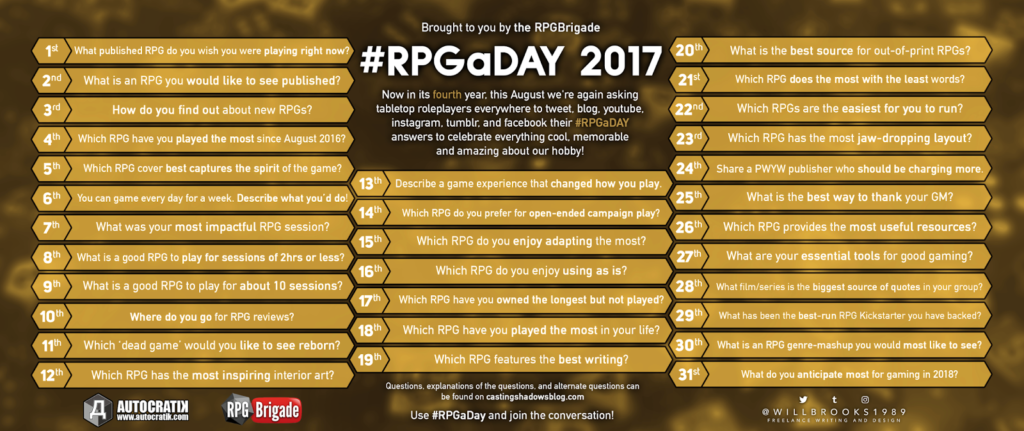This post is a part of the #RPGaDAY series for 2017 by David F. Chapman and RPGBrigade. For more information, see this post at AUTOCRATIK. I'm modifying per suggestions from S. John Ross as well as applying my own interpretations. Comment with your answers or links to your own posts!
Blog fatigue must be setting in; it looks like I missed another day! This time, I didn't even realize it. So here's a special double-issue with not even a flimsy reason attached.
Day 22 - Which RPGs are the easiest for you to run?
My first thought for this question was immediately Lasers & Feelings by John Harper. It's not only a super-light game mechanically, but it comes complete with nicely constrained character creation, a setting, an adventure generator...basically everything you need to just grab it and go, even with people completely new to roleplaying and like ten seconds of prep time. It lightly piggybacks onto Star Trek for tone and maybe tropes, but in this particular case, because the adventure generator plots things out for you, that's not even really necessary for the core experience.
The question did give me a lot to think about, though. I've never really spent time thinking about the "ease" of running a particular game. In my mind, the big factor that a game can affect is the rule complexity, but that's more about how easy the game is to learn, and I feel like once you learn a game, the ease of running it is probably about the same as any other game. Some games will (or can) require more prep time, some may require more rules mastery than others, but once you're comfortable bringing it to the table, I feel like the ease of running doesn't depend on the game anymore. Games that are the easiest to run are the ones with a good group of players! If everyone's on board for setting and tone and so forth, and if you've got players that are imaginative and collaborative and enjoy playing, then honestly, the properties of the game itself aren't that important anymore. I think that there may be games that may be inherently harder to run due to their innate characteristics, like games that need a lot of record-keeping during play, for example. But it's my opinion that, by and large, ease of running is going to come down to the players and your GM techniques and toolboxes.
Day 23 - Which RPG has the most jaw-dropping layout?
This was a pretty difficult question for me, as layout is not something I particularly notice about games. As discussed previously, I do enjoy me some RPG artwork, but I don't feel like I get the same level of communication about a game from the layout as other people do. So to answer this question, I'm just going with a game that stuck out for me as being particularly eye-catching and easy to use, and that is Numenera from Monte Cook Games. I like the smooth two-column format bolstered by additional notes and references in an oversize margin. It's got nice, noticeable (but not intrusive) cutouts and boxed text, a classic style of table that appeals to me as an old AD&D-head, art that is plentiful, aesthetically pleasing, and well-placed (even in mid-text, which I feel like is a hard thing to do well), handy color-coded "parts" of the book (basically groups of chapters), even neat and evocative page decoration. It's pleasant to read as a text, and it's also useful as a reference manual, which are two sometimes opposing aspects that all RPG books have to try and accommodate. I don't think there's any question that MCG puts out quality products, and I feel like Numenera was the flagship offering in what became a spectacular line.

